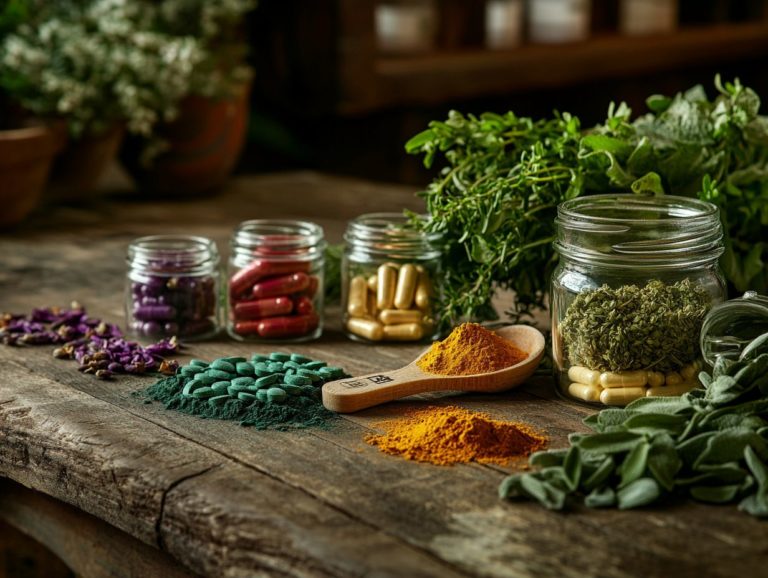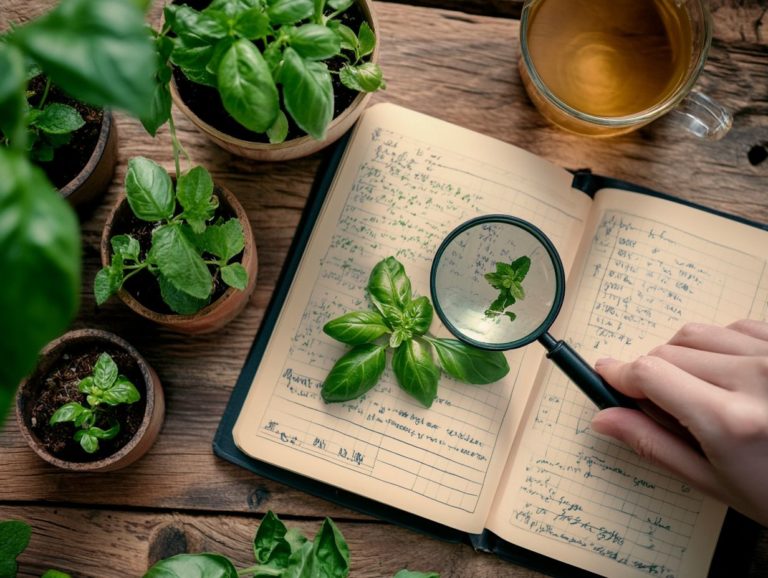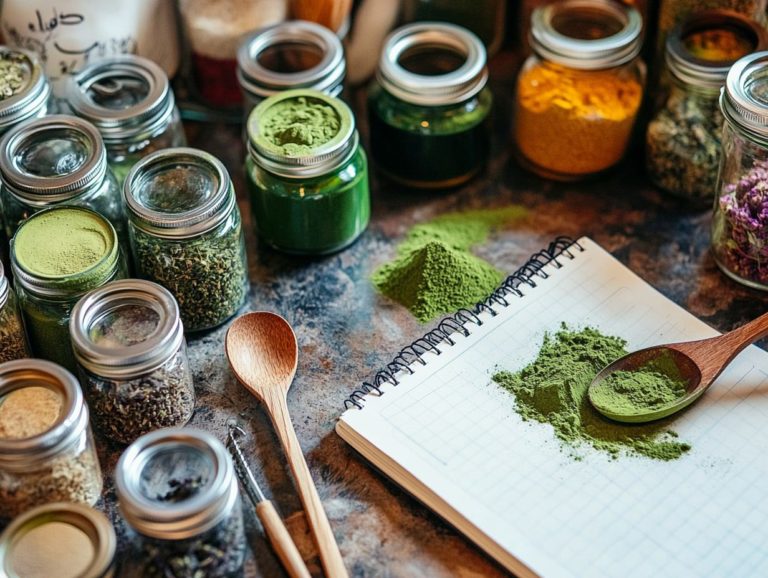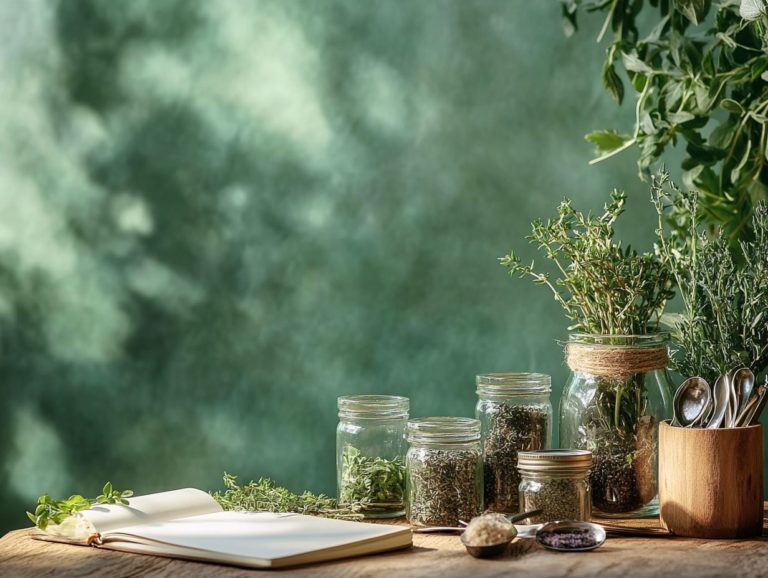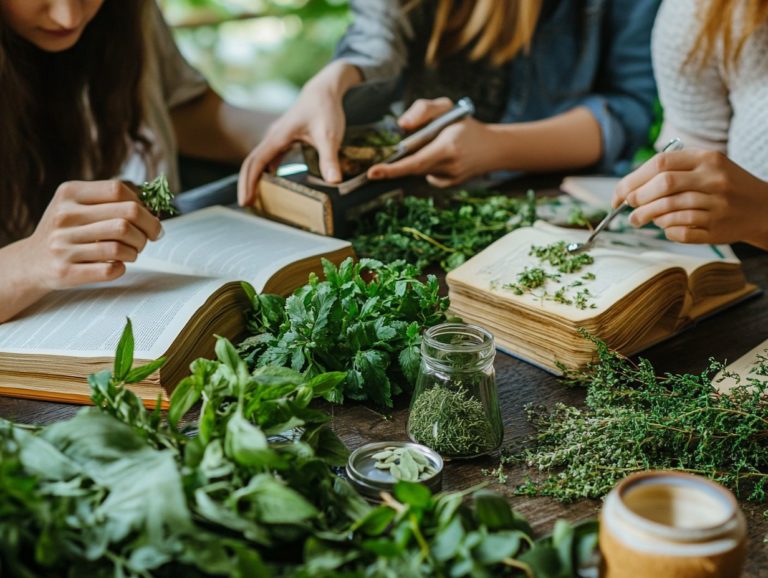Proper Dosage for Herbal Teas: A Quick Guide
Herbal teas are more popular than ever and for good reason! They captivate enthusiasts not only with their delightful flavors but also with the myriad health benefits they bring to the table.
This article delves into the essence of herbal teas and the common health perks they offer. Understanding the right dosage is crucial, as it s influenced by factors such as your body weight, age, and specific health conditions.
You ll find tailored recommendations for popular herbal teas along with essential tips for preparing and enjoying them, ensuring you maximize their benefits.
Join us on this exciting journey to transform your tea experience today!
Contents
Key Takeaways:
- Consider your body weight, age, and health conditions when choosing the right dosage for herbal teas. These factors can greatly affect the effectiveness and safety of the tea.
- Different herbal teas may have unique recommended dosages due to their specific properties and effects on the body. Researching and following these recommendations will help ensure the best results.
- To get the most out of your herbal tea, follow best practices for preparation and consumption. Use high-quality herbs, steep the tea properly, and limit your intake to avoid potential side effects.
What are Herbal Teas?
Herbal teas, often known as herbal infusions, are your gateway to a delightful and health-boosting experience. By steeping a variety of herbs, flowers, or plant parts in hot water, you create a beverage that tantalizes your taste buds while offering natural benefits.
Esteemed within the realm of herbal medicine, these drinks are favorites among herbalists and health enthusiasts, especially for tackling both chronic and acute conditions. Imagine enjoying the unique flavors and health perks of herbs like echinacea, rose petal, and hibiscus, each tailored to your individual palate.
Don t overlook the comforting power of herbs like peppermint and chamomile, known for their soothing properties and often recommended for digestive support or achieving a good night s sleep.
The way you prepare these teas is just as vital. While infusions work wonders for delicate leaves and flowers, capturing their essence beautifully, strong herbal brews are your go-to for tougher roots and barks, ensuring you extract every bit of potency.
Herbalists emphasize specific preparation techniques to enhance both the flavor and therapeutic efficacy of your brews. They guide you on your journey to harness the myriad advantages herbal teas offer, including stress reduction, boosted immunity, and an overall sense of well-being. It’s also important to be aware of safe usage; you can find crucial information in our guide on herbal remedies and safe dosage for adults and children.
Benefits of Herbal Teas
Herbal teas present a wealth of health benefits, establishing themselves as essential components of herbal remedies for both chronic and acute conditions. They provide hydration and critical natural benefits that elevate overall wellness.
Teas like hibiscus and echinacea stand out for their distinctive health contributions, thanks to their rich nutritional profiles and energetic properties. These teas can support various functions, from boosting immune health to enhancing digestive well-being.
Common Health Benefits
Herbal teas offer a range of health benefits supporting your immune system, aiding digestion, and relieving stress, making them staple recommendations among herbalists for promoting holistic well-being. Echinacea is often praised for its immune-boosting properties, while hibiscus is recognized for helping regulate blood pressure and bolstering heart health. These examples illustrate how powerful herbal remedies can be in managing both chronic and acute conditions.
Along with these popular herbs, peppermint tea is frequently lauded for its soothing effects on digestive issues like bloating and indigestion. Many herbalists suggest enjoying this refreshing beverage during meals to enhance digestion and alleviate discomfort.
Similarly, chamomile tea is celebrated for its calming qualities, which may reduce anxiety and improve sleep quality, contributing to overall mental wellness. Many individuals share personal stories of feeling more relaxed after incorporating these herbal infusions into their routines, emphasizing the significant impact these natural remedies can have on enhancing overall health and emotional balance.
Factors that Affect Dosage
Understanding the factors that influence dosage is essential for anyone utilizing herbal teas or remedies. The effective dosage can vary considerably based on your individual body constitution, age, and the specific preparation methods you use.
For instance, an adult requires a different dosing strategy compared to a child. It’s crucial to consider aspects such as body weight and any existing health conditions when determining the appropriate amount of herbal teas or tincture, an herbal extract made by soaking herbs in alcohol or another solvent, to consume.
Body Weight, Age, and Health Conditions
Body weight, age, and existing health conditions are key factors that guide your dosing of herbal teas. These factors can significantly influence potency and effects.
For children, adhere strictly to pediatric dosage guidelines. Adults often need a more nuanced approach, considering any chronic or acute health conditions to ensure both safety and effectiveness.
If you have a child with asthma, for example, they may need a gentler formulation of eucalyptus tea with lower doses. Conversely, if you’re an adult dealing with anxiety, increasing your chamomile tea intake might provide the calming effect you crave. For those looking to explore tea options, check out these easy herbal tea recipes for beginners.
If you’re a senior with a sensitive digestive system, it may be wise to opt for milder herbal choices, like peppermint tea, with a lower dosage than what a younger adult might take. Personal health conditions, such as diabetes or hypertension, can also require adjustments in how much herbal tea you consume. This highlights the need for tailored approaches to herbal tea: types and benefits for both adults and children alike.
Proper Dosage for Different Herbal Teas
Understanding the proper dosage for different herbal teas is crucial for maximizing their health benefits. Recommendations can vary significantly based on the specific herbal preparation and its intended use.
Herbalists often provide tailored dosages for popular teas like echinacea and hibiscus. This careful consideration ensures that everyone can enjoy safe and effective consumption, regardless of their demographic.
Specific Recommendations for Popular Teas
Specific recommendations for popular herbal teas, such as echinacea for immune support and hibiscus for blood pressure regulation, are vital for determining effective dosing strategies.
By following these herbalist guidelines, you can tailor your intake to meet your unique health needs and harness the beneficial properties these herbal teas provide.
A common dosage for echinacea typically falls between 300 to 500 mg of standardized extract taken three times daily. This can significantly enhance your immune function, especially during the cold season.
In contrast, hibiscus tea, usually enjoyed by steeping dried flowers in hot water, can aid in reducing blood pressure levels when consumed consistently. A typical recommendation suggests sipping two to three cups daily for optimal benefits.
Consider your unique health profile, including any existing conditions and medications, when crafting your herbal tea regimen. This will help you achieve maximum health benefits safely, especially by exploring herbal tea: a natural approach to wellness.
Tips for Preparing and Consuming Herbal Teas
When preparing and enjoying herbal teas, using the correct methods is crucial to unlock the full potential of these medicinal brews. Dive into the subtleties of each technique to profoundly influence both the flavor and potency of your final cup.
This understanding not only elevates your tasting experience but also amplifies the health benefits these teas offer.
- Choose your herbs carefully.
- Decide whether to make an infusion (steeping) or a tincture (soaking in alcohol).
- Measure the appropriate dosage.
- Steep for the recommended time.
- Enjoy your tea mindfully.
Don’t miss out on the incredible benefits of these herbal teas start experimenting today! Share your experiences and discover the joy of brewing your unique herbal blends.
Best Practices for Maximum Benefits
To unlock the maximum benefits from herbal teas, it’s essential to follow best practices in their preparation and consumption. This helps you tap into the emotional and health benefits these teas offer!
For example, using fresh herbs, steeping for the right duration, and understanding the specific advantages of each type of tea can significantly enhance its effectiveness as a remedy for various health conditions.
It’s crucial to use the right water temperature when brewing. Some delicate herbs release their beneficial compounds best at lower temperatures, while others thrive when steeped in boiling water. Measuring the correct herb-to-water ratio ensures a balanced flavor and potency. For more guidance, check out this guide on how to brew perfect herbal infusions. Once brewed, allowing the tea to infuse for several minutes will activate its medicinal properties to the fullest.
Incorporating practices such as using glass or ceramic containers can prevent chemical reactions that might occur with certain metals. Don t hesitate to experiment with complementary ingredients like honey or lemon, as these can elevate both the tea’s health benefits and your enjoyment, transforming the experience into something both delightful and therapeutic!
Frequently Asked Questions
What is the ideal amount of herbal tea for me?
The ideal amount of herbal tea varies depending on the type of tea and your individual needs. Generally, a recommended dose is 1-2 teaspoons of dried herbs per 8 ounces of water.
How often should I enjoy herbal tea?
It is recommended to drink herbal teas 2-3 times a day for maximum benefits. However, listen to your body and adjust the frequency based on your specific needs!
Are there any side effects to drinking herbal tea?
When consumed in proper amounts, herbal teas are generally safe for most people. However, some herbs may cause adverse effects or interact with certain medications. It s wise to consult with a healthcare professional before regularly consuming herbal teas. Common safe herbs include chamomile and peppermint, while some, like St. John s Wort, should be approached with caution.
Can I mix different types of herbal teas together?
Absolutely! You can mix different types of herbal teas to create your own blend. Just make sure to research the properties and potential interactions of each herb before combining them!
How can I find the right dosage for my specific needs?
It s best to consult with a qualified herbalist or healthcare professional to determine the proper dosage for your personal needs. They can consider your health history and any potential interactions to create a personalized dosage recommendation.
Is it safe for children to enjoy herbal teas?
In general, herbal teas are safe for children when consumed in appropriate doses. However, it s best to consult with a pediatrician to determine the proper dosage and ensure the safety of specific herbs for children.

